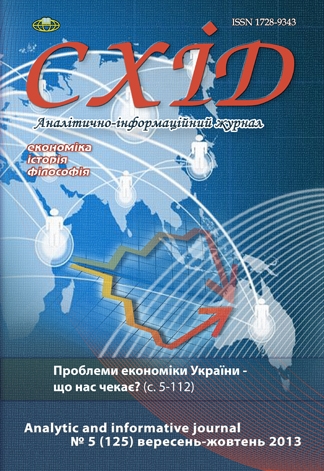Assessment of the financial stability of public and communal higher educational establishments on the base of fuzzy logic
DOI:
https://doi.org/10.21847/1728-9343.2013.5(125).19113Keywords:
financial stability, state and communal higher educational establishments, intellectual model, fuzzy logic, fuzzy set, linguistic variables, rulebaseAbstract
The essence of the financial stability of public and communal higher educational establishments in the context of current socioeconomic situation in Ukraine has been determined as a state of the financial resources which enables educational establishments to organize the qualitative educational and scientific activity and form the occupational competitiveness of graduates on the base of complete and timely financing of submitted expenditures. The basis of efficient economical activity (including fulfillment of special-purpose programmes) and qualitative educational services is the reception of plan special-purpose financial recourses.
The author has explored that current practice of the assessment of the financial stability of state higher educational establishments doesn’t take into account the main aspects of this process in their interconnection and interdependence.
The intellectual model of estimating the financial stability of state higher educational establishments has been developed on the base of fuzzy logic which enables to assess the level of the financial stability of educational establishments via simultaneous application of quantitative (maneuverability equity ratio, autonomy coefficient, funding coefficient, the ratio of correlation conducted expenditures and income received, the ratio of payables and receivables, the ratio of the approved cost estimate of special and general funds, the ratio of cash and actual expenditures) and qualitative (assessment of scientific and educational potential quality, assessment of education quality, evaluation of international recognition, the graduates satisfaction of received education and the opportunity to use it in work, employers perception of quality of education in Ukrainian universities, experts perceptions of the quality of education in Ukrainian universities, cooperation between universities and companies-employers) indexes.Downloads
References
Боголіб Т. М. Фінансове забезпечення розвитку вищої освіти і науки в трансформаційний період : [монографія] / Т. М. Боголіб. – К. : Міленіум, 2006. – 506 с.
Экономика и принцип золотого сечения [Електронний ресурс]. – Режим доступу : http://zn.ua/ECONOMICS/ekonomika_i_printsip_zolotogo_secheniya-30522.html.
Рейтинг вузів України ЮНЕСКО «Топ–200 Україна» [Електронний ресурс]. – Режим доступу : www.abiturient.in.ua/ru/rating/rating_unesko.
Рейтинг українських ВНЗ за ступенем задоволеності освітою «Компас» [Електронний ресурс]. – Режим доступу : http://www.yourcompass.org.
Сафонова В. Є. Економічна стійкість вищого навчального закладу як чинник підвищення його конкурентоспроможності / В. Є. Сафонова // Вісник економічної науки України. – 2010. – № 2. – C. 133–137.
Тичинська Л. М. Теорія ймовірностей [Електронний ресурс] / Л. М. Тичинська, А. А. Черепащук. – Режим доступу : http://posibnyky.vntu.edu.ua/t_i/35.htm.
Фишберн П. Теория полезности для принятия решений / П. Фишберн. – М. : Наука, 1978. – 352 с.
Штовба С. Д. Введение в теорию нечетких множеств и нечеткую логику [Електронний ресурс] / С. Д. Штовба. – Режим доступу : http://www.matlab.tutornet.ru.
REFERENCES
Boholib T. N. (2006), Financial provisions the development of higher education in the transformation period, Millennium, Kyiv, 506 p. (ukr).
Economics and Golden Section Principle, available at: http://zn.ua/ECONOMICS/ekonomika_i_printsip_zolotogo_secheniya-30522.html (rus).
Rating universities in Ukraine UNESCO "Top-200 Ukraine", available at: www.abiturient.in.ua/ru/rating/rating_unesko (ukr).
Ranking of Ukrainian universities by degree of satisfaction with education "Compass", available at: http://www.yourcompass.org. (ukr).
Safonova V. Ye. (2010), Visnyk ekonomichnoi nauky Ukrainy [Herald of Economic Sciences of Ukraine], № 2, pp. 133–137 (ukr).
Tychynska L. M., Cherepashchuk A. A., Probability Theory, available at: http://posibnyky.vntu.edu.ua/t_i/35.htm (ukr).
Fishbern P. (1978), Utility theory for decision making, Nauka, Moscow, 352 p. (rus).
Shtovba S. D., Introduction to the theory of fuzzy sets and fuzzy logic, available at: http://www.matlab.tutornet.ru. (rus).
Downloads
Published
How to Cite
Issue
Section
License
Copyright (c) 2013 Yulia Kharchuk

This work is licensed under a Creative Commons Attribution-NonCommercial-NoDerivatives 4.0 International License.
1. Authors bear responsibility for the accuracy of facts, quotations, numbers and names used.
2. Manuscripts are not sent back.
3. The publisher does not always agree with the authors' opinion.
4. The authors reserve the right to authorship of the work and pass the first publication right of this work to the journal under the terms of a Creative Commons Attribution-NonCommercial-NoDerivatives 4.0 International License. This license allows others to distribute (copy) the published work for non-commercial purposes, provided there is mandatory attribution to its authors and a link to the first publication in our journal.
5. The authors have the right to conclude separate supplement agreements that relate to non-exclusive work distribution in the form in which it has been published by the journal (for example, to upload the work to the online storage of the journal or publish it as part of a monograph), provided that the reference to the first publication of the work in this journal is included.

